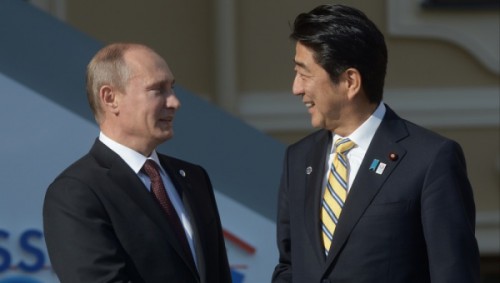mardi, 29 avril 2014
Will Japan and Russia Escape the New Cold War?

Will Japan and Russia Escape the New Cold War?
As Russian Foreign Minister Sergey Lavrov was visiting Beijing last week, it was announced that the visit to Moscow by Japan's foreign minister Fumio Kishida was being postponed. The announcement, of course, came amid the rising tensions in Ukraine and the continuing fundamental deterioration of the West's relations with Russia. Japan, after all, is a loyal ally of the United States.
Yet, both Tokyo and Moscow have gone to some lengths to limit the damage. The joint announcement was couched in most polite phrases. The Russian foreign ministry spokesman, Alexander Lukashevich, allowed no criticism in his public comments on the postponement decision. Clearly, with the threats of economic sanctions against Russia still on the table in Washington and in EU capitals, even after the recent Geneva agreement on Ukraine, Moscow looks to Tokyo to make up for the likely losses in Europe and North America.
Japan's Prime Minister, Shinzo Abe, for his part, has not yet given up on Russia. As a geopolitical thinker, he needs Russia in an effort to balance China's rise. As a pragmatist, he thinks of going beyond simply importing energy from Russia, and seeks a stake in Russia's energy projects. As a strategist, he does not want Moscow to step up too much the technological level of its arms transfers to China's People's Liberation Army, by delivering, in particular, the S-400 air defense systems. Ideally, Shinzo Abe would also want to become the prime minister to finally resolve the almost 70-year-old territorial issue between Tokyo and Moscow.
None of this is going to be easy, but none of this is totally impossible either-provided the Japanese do their part by becoming what Germany, until recently, has been to Russia: a major technological partner, a leading investor, and a gateway to the wider region. Doing this will be exceedingly difficult, of course, in the current environment of intensifying U.S.-Russian rivalry. However, Abe may have a few useful arguments to offer to President Barack Obama when he comes to Tokyo.
Why should the US-Russian rivalry be allowed to strengthen Beijing? Who benefits when the United States is less comfortable and Japan feels less safe? In this new cold period in Russian-Western relations, there are already a few protected areas of collaboration, like non-proliferation. Why not a vibrant Japan-Russia link too? After all, wasn't it the one missing piece, even a strategic oversight in the original U.S. "pivot to Asia" concept?
Dmitri Trenin is Director of the Carnegie Moscow Center.
This article was originally published on www.carnegie.ru
00:05 Publié dans Actualité, Affaires européennes, Géopolitique | Lien permanent | Commentaires (0) | Tags : russie, japon, europe, asie, affaires asiatiques, affaires européennes, politique internationale, géopolitique, diplomatie |  |
|  del.icio.us |
del.icio.us |  |
|  Digg |
Digg | ![]() Facebook
Facebook



Les commentaires sont fermés.